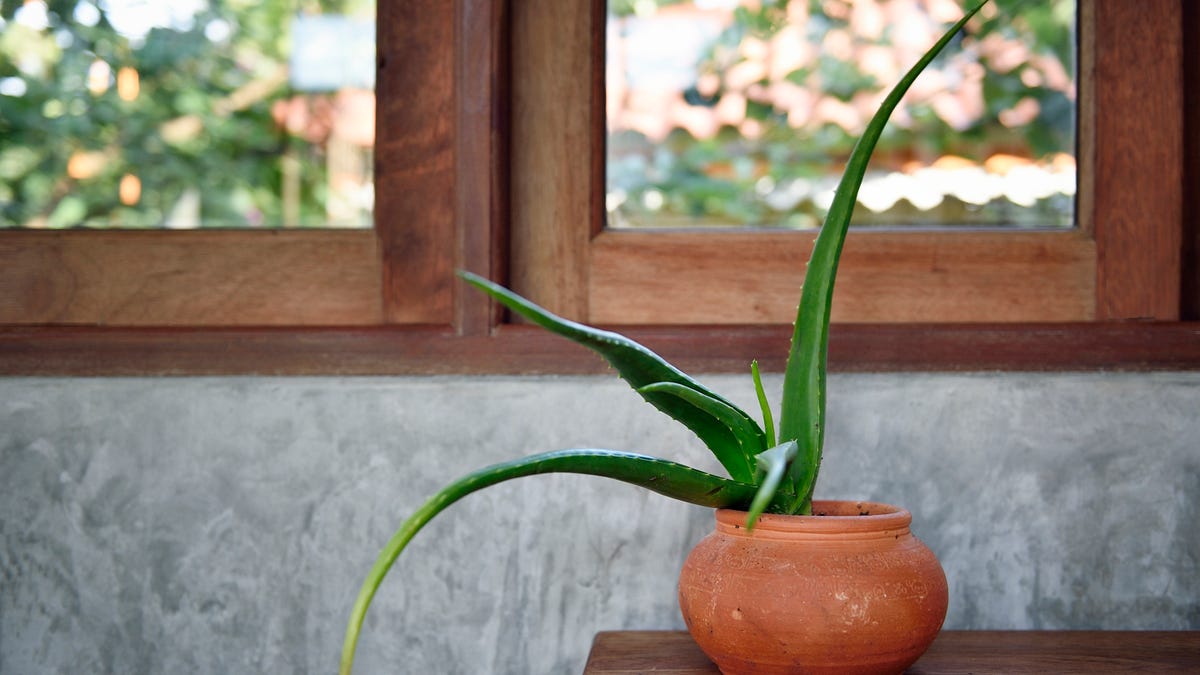
Even the most prolific plant killers can bet on keeping succulents alive. After all, the family of desert plants can withstand even the harshest of living conditions, making them ideal for newbies or those who constantly travel. Just because a plant can go weeks without water and sunlight doesn’t mean that it should.
“Succulents are fun. Don’t overthink them,” says Ellis McQuillan, lead designer at Petoskey, Michigan-based Sweetwater Floral, a full-service flower and plant shop. “They are a great grouping of plants to turn that thumb a bit more green, telling us exactly what they need and requiring minimal care.”
To maximize the growth and vibrancy of your new living things, we tasked McQuillan to share her top tips on proper plant care. Here are seven to keep in mind before investing in cacti, Mexican snowballs, zebra plants and the like.
For more, see our list of houseplants that are impossible to kill and others that keep bugs from invading your home.
1. Give succulents as much sun as possible
Succulents crave sunlight just like the rest of us.
If you’re worried about placing a pot or planter on an ultra-sunny windowsill, fear not. “These plants love the sun… and as much as possible,” says McQuillan.
If the rays are a bit too strong over an extended period, look for signs of crispy edges, unnaturally long stems and discoloration. A simple turning of the pot can usually remedy the situation (if done consistently) or you can move your succulents to an area that doesn’t get direct sunlight for the entire day.
2. Bring succulents outside
Give your plants some direct outdoor sunlight during the summer months.
Those fortunate enough to own or rent outdoor living space can bring their plants outside during the summer months. This will allow for more unfiltered sunlight, fresher air, better drainage, and an avoidance of root rot.
“Chances are that no matter where you live, your succulent can thrive outside in summer and come inside for the winter,” says McQuillan. “This makes an indoor display turn into an adorable patio table centerpiece for the season.”
3. Let succulents go dormant
When your succulent stops growing, that that as a sign to stop or slow down watering.
“Succulents need to go dormant for a part of the year,” explains McQuillan. “During their ‘dormant time,’ don’t water them or water them super rarely.”
Signs of dormancy include a pause in growth, yellow and dropped leaves, shrinking, and even freckles. Do not confuse this with death, as most pitiful-looking succulents will bounce back if you exercise a bit of patience. As long as the central stem is green and the root area remains moist, you can count on your plant being alive.
4. Water succulents when wrinkly
Aloe is a succulent that’s particularly useful during sunburn season.
The general rule of thumb for watering succulents is once every two weeks (or even once a month during winter). If you notice the leaves start to wrinkle, they may be begging for a bit of hydration.
“Succulents are good at telling us what they need,” reminds McQuillan, who advises to err on the side of *not* overwatering.
5. Consider your pot
Rubber plants are another hearty large succulent, but they need care and attention just like other plants.
Your succulents’ initial home may be temporary, much like hermit crabs, as repotting should take place when the plant increases in size.
“Root systems on succulents can be a bit more shallow,” explains McQuillan. “Avoid planting a small plant in a giant pot. Instead, gradually re-pot as it grows.”
6. Drainage is a must for succulents
The ZZ plant is a succulent that grows bigger than most.
If there is one thing your succulent hates most, it’s wet feet.
“A layer of rock or stone on the bottom of your pot is a must, along with a drainage hole [if possible],” she adds. This will prevent a puddle of water from forming within the pot, which could essentially drown your succulents and cause rotting.
7. Be mindful of other plants
Choosing the right pot size can help your succulent reach its full potential.
Succulents may be beautiful, but they’re also selfish. If you pot them with other water-guzzling plants like ferns, they’re going to fight for survival.
“Keep everything in the desert family,” recommends McQuillan. This can include common varieties like aloe, agave, and jade plants, which thrive codependently so that you can enjoy succulents of any shape or color, all year long.